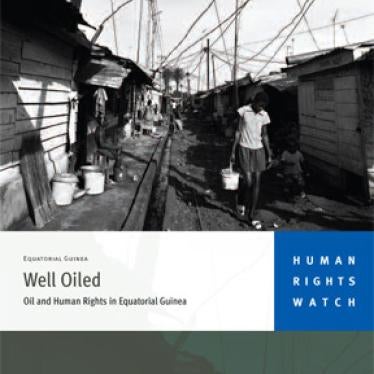Mr. President,
Human Rights Watch recognizes that the UPR process for Equatorial Guinea represents a truly significant opportunity. If used well, it has the potential to improve the dire human rights situation for the population there. Unfortunately, the government of Equatorial Guinea has not made good use of that opportunity. To the contrary, its engagement in the UPR to date raises serious doubts about its commitment to human rights standards as a whole.
One key benefit of the UPR process is the thorough evaluation it offers of each government's human rights practices. The UN compilation, stakeholder submissions, and remarks by many governments from different regional groups during the interactive dialogue in December served to highlight the conditions of severe repression and needless deprivation faced by the people of Equatorial Guinea. The value of this exposure should not be underestimated. But we regret that the government has refused to acknowledge its abysmal human rights record.
For example, its national report mentioned that torture is prohibited by law but was silent about the finding by the UN Special Rapporteur on torture and by many NGOs, including Human Rights Watch, that torture and ill-treatment are nevertheless systematic in Equatorial Guinea. In a press briefing last year, President Teodoro Obiang said that the UN rapporteur "does not give objective reports" and claimed that "there is no torture" in Equatorial Guinea. This is not the sign of a government that recognizes its human rights failings and intends to correct them.
Secondly, the UPR process is meant to allow civil society in the country to engage in an open dialogue with their government about human rights. Again, the government of Equatorial Guinea squandered this opportunity. Intimidation and abuses against real or perceived opposition voices, as well as burdensome registration and reporting requirements for independent civil society organizations, severely hinder the capacity of local NGOs to engage on human rights issues. As a result, there is not a single legally registered independent human rights group in the country. The claim that the government engaged in wide consultation is also simply not supported by the facts. To illustrate, not a single one of the human rights defenders from Equatorial Guinea who are here today was informed of any consultation-even though some of them submitted reports for the UPR review.
Third, the UPR process is designed to result in a firm commitment by the reviewed governments to adopt and most importantly implement concrete recommendations. We acknowledge that the government of Equatorial Guinea has accepted many of the recommendations proposed by its peers, but we note with concern that grand promises made in the past have failed to affect its behavior. For example, although the government has repeatedly maintained that it is committed to investing its vast oil wealth to benefit its people-76.6 percent of whom live in poverty, as noted in its national report-the government continually fails to allocate available funds for essential social services. President Obiang has openly rejected any criticism, in this case claiming that "the people live very well," with the exception of lazy citizens who "don't want to work."
The complete inadequacy of the government's approach to the UPR justifies our skepticism about its true commitment to human rights. It also demonstrates the urgent need for active civil society participation and vigorous international monitoring in the follow-up to its UPR. With strong encouragement, constructive pressure, sustained monitoring, and full civil society engagement, the important recommendations resulting from the UPR review could lead to meaningful improvements in Equatorial Guinea's human rights performance. We call on all governments to insist on a vigorous, transparent, and participatory follow-up mechanism to translate the UPR recommendations into meaningful action. There is too much at stake for the people of Equatorial Guinea to allow this unique opportunity to be lost.







